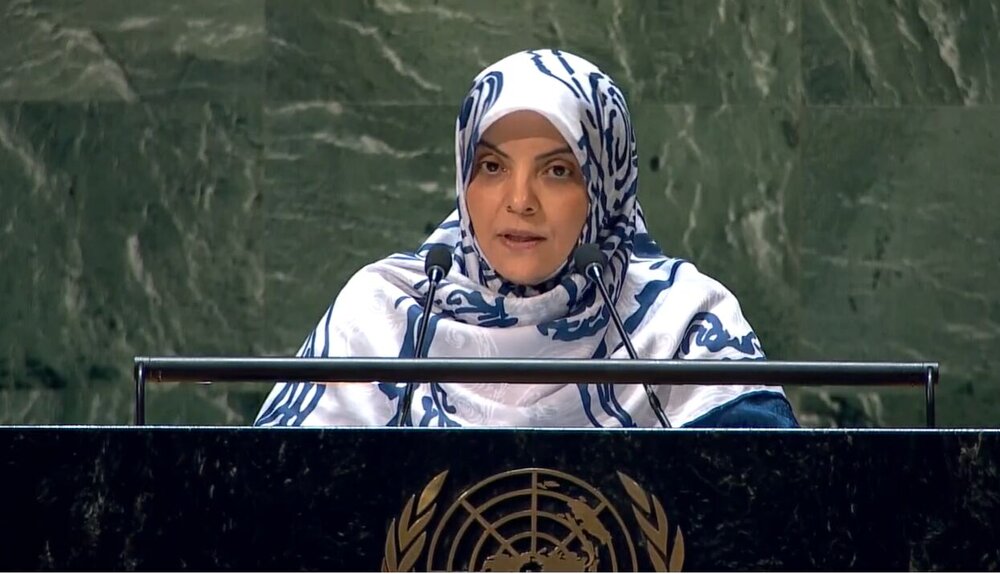World should move to end unilateral coercive measures: Iran

TEHRAN - The deputy ambassador of the Islamic Republic of Iran to the United Nations, Zahra Ershadi, has condemned the unilateral coercive and unjust measures that affect the health and medical sectors in countries, calling on the international community to take an effective step to end the unilateral sanctions against Iran.
“As was emphasized in the report of the Secretary-General of the United Nations entitled Eliminating Discrimination to End the Spread of AIDS, efforts to eradicate the roots of this disease until the year 2030 are behind the time plan drawn up. So, member states should take effective and serious measures to address the challenges that impede reaching this goal,” Ershadi said in her speech Friday at the United Nations General Assembly on AIDS.
She noted, “The world is not only facing HIV now, but at the same time has to face the repercussions and consequences of the outbreak of the Corona pandemic. We are witnessing in such difficult circumstances that the global community faces problems to address the obstacles that impede equal access to health and medical services.”
Ershadi pointed to the achievements of Iran in combating AIDS and said, “The Islamic Republic of Iran is among a limited number of countries in Asia that have made remarkable achievements in controlling and treating HIV. Iran is among the countries that have provided safe access to specialized health and treatment needs for individuals infected with AIDS.”
She added that rooting out the transmission of AIDS from mother to child is one of Iran's important priorities, and the joint United Nations program to combat AIDS can play an important role in this field.
She continued, “As was emphasized in the third recommendation of the Secretary-General's report, it is necessary to put the latest medicines and health and treatment technologies related to the prevention and treatment of AIDS within the reach of developing countries quickly. Therefore, with this assurance, it is necessary to remove all obstacles that prevent these countries from obtaining such medicines.”
Ershadi stated, “Unfortunately, the unilateral coercive measures, including the unilateral economic, financial and banking sanctions imposed on Iran, seriously violate the right of Iranians to access health and treatment services, and individuals who face problems resulting from AIDS suffer in particular from this situation directly.”
“Coercive and unjust unilateral measures block the normal channels of international cooperation and are a source of concerns that negatively affect Iran’s efforts to confront diseases. Moreover, they severely restrict access to timely and effective access to diagnosis, medicine, treatment, medical devices and technology needed to provide comprehensive health and treatment services, especially with regard to individuals infected with AIDS,” she said.
Ershadi noted, “Iran, while condemning such illegal and unjust measures and policies and illegitimate approaches which impinge on countries' health sectors and hinder the provision of services to patients, including those living with HIV, calls on the members of the international community to take effective, urgent and practical measures to lift the forgoing coercive sanctions.”
Earlier, in a letter dated June 2, 2020, to the UN Security Council, Iranian Ambassador to the UN Majid Takht Ravanchi took a jab at countries using sanctions as a state policy.
“Unilateral coercive measures are employed by certain states as a method of war to starve innocent civilians. These international wrongful acts violate the UN Charter and international law. We believe that those countries that impose unilateral coercive measures including sanctions as a state policy should be held accountable for such crimes,” Takht Ravanchi said.
He added, “For decades, Iran has been the target of the most severe economic and financial sanctions of the United States, directly endangering the lives of Iran's most vulnerable population, including children, the elderly, and patients. Even some patients, particularly children with rare diseases, have died as a result of import restrictions on medicine and medical supplies, a heartbreaking reality.”
The Iranian ambassador further said, “As a result of Iran's submission to the International Court of Justice, on October 3, 2018, the Court unanimously issued an Order on provisional measures requiring the United States to remove any sanction on the importation of humanitarian goods. The Court also ordered the U.S. to make sure that all necessary permits and authorizations are in place, and that payment and other financial activities linked to the humanitarian goods and services are not restricted. Unfortunately, the U.S. has not only failed to comply with the Court's Order but also defied it by imposing additional sanctions, particularly during the COVID-19 pandemic.”
He added, “In a statement made during her recent visit to Tehran on May 18, 2022, the UN Special Rapporteur on the negative impact of unilateral coercive measures emphasized the illegality of such inhumane measures, asserting that ‘States have an obligation under international human rights law to ensure that any activity under their jurisdiction or control does not result in human rights violations, and in this regard, she calls on sanctioning States, particularly the United States, to observe the principles and norms of international law, and to lift all unilateral measures, in particular on those areas affecting the human rights and the lives of all the people in Iran’.”
